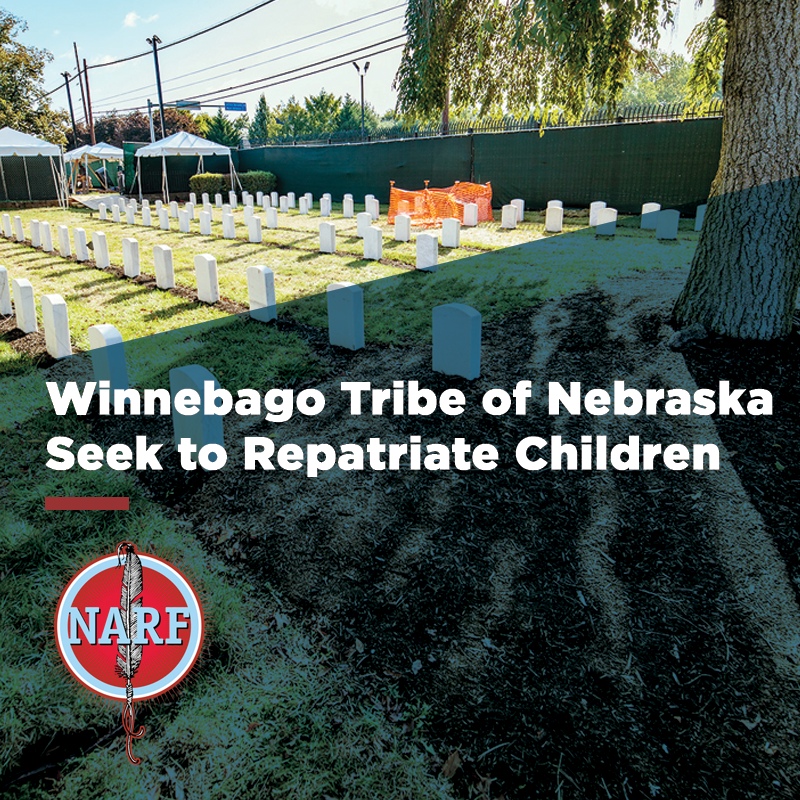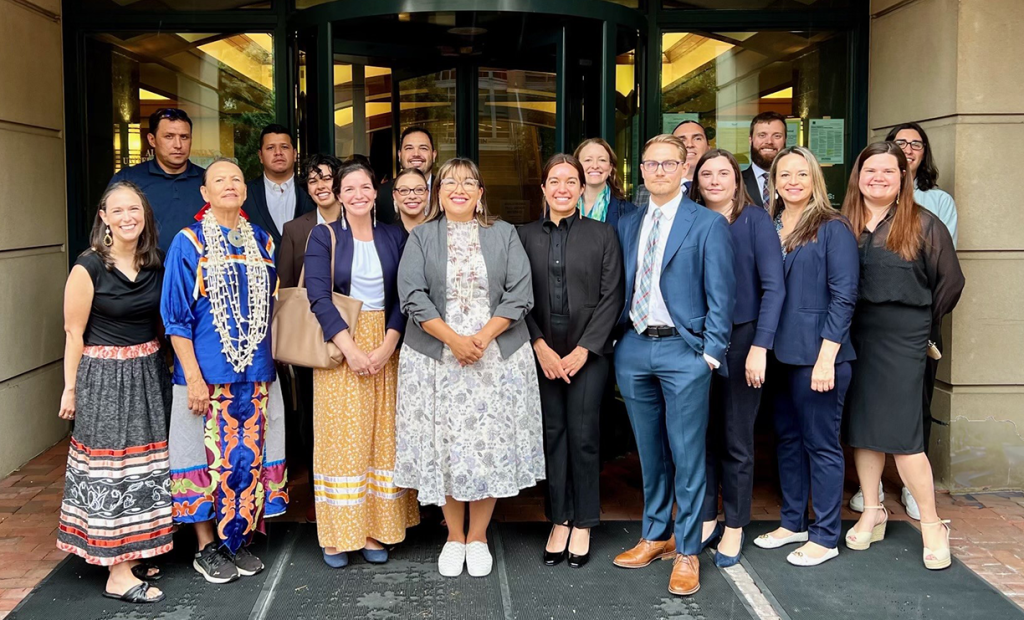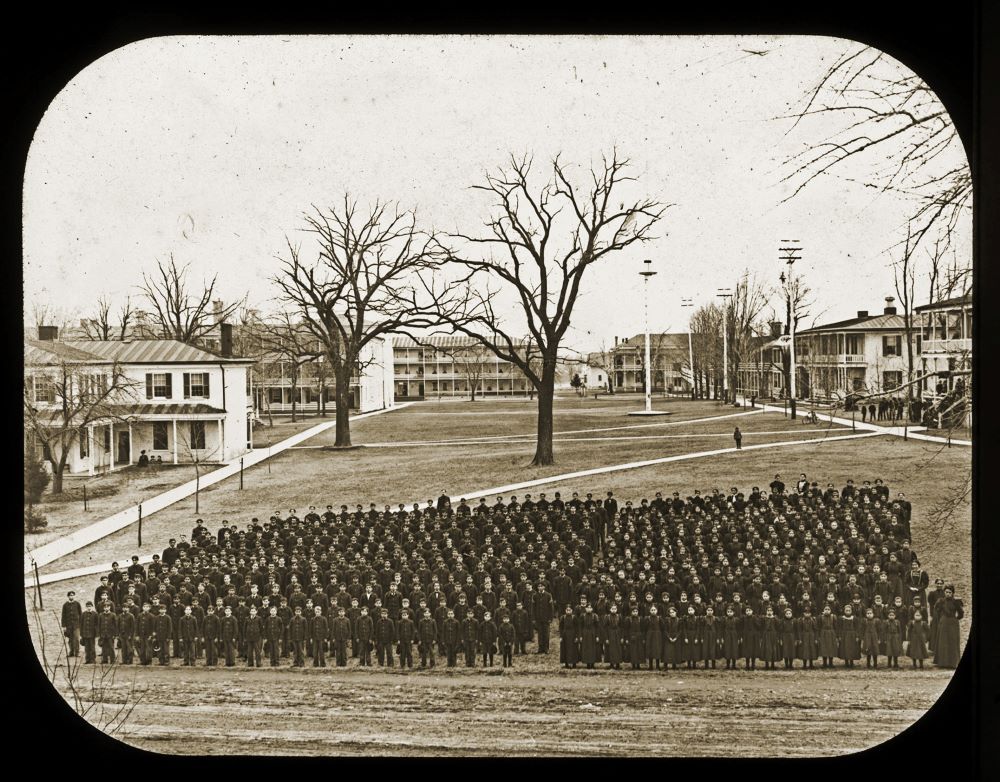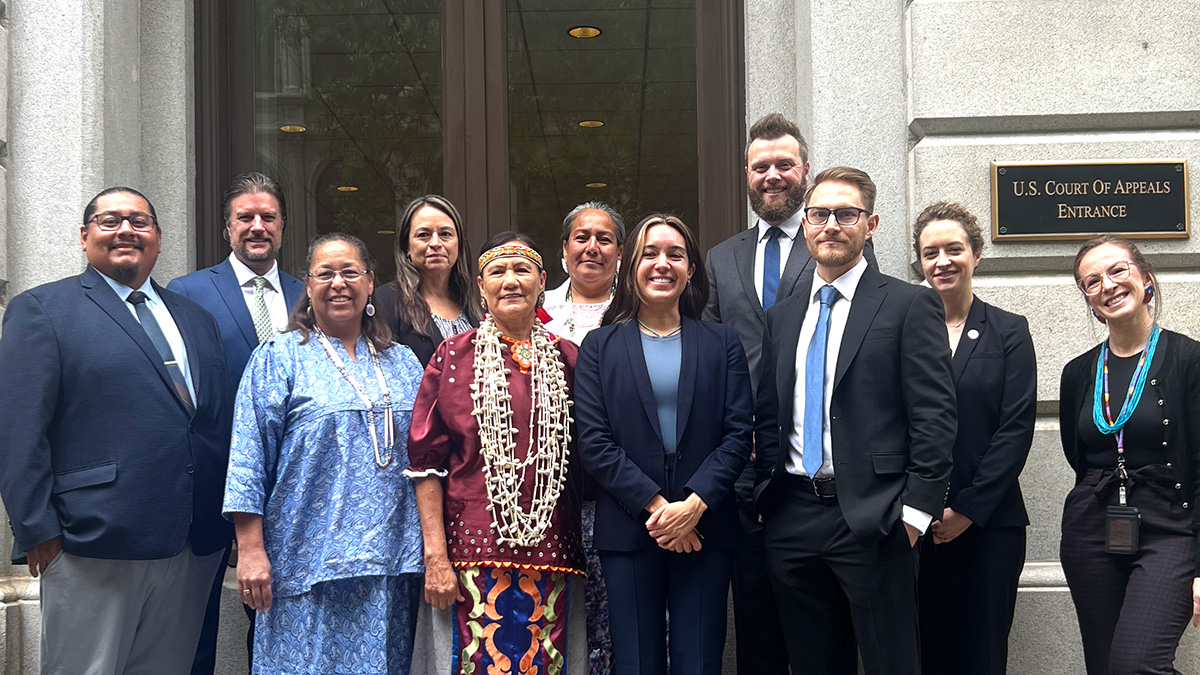This information may trigger individuals suffering from boarding school and related intergenerational trauma. To find support and other resources, visit the National Native American Boarding School Healing Coalition at: https://boardingschoolhealing.org/self-care-resources/
Background:
The history of the Carlisle Indian Industrial School represents the haunting legacy of Indian boarding schools, institutions which were weaponized against Native American children and Tribal Nations in the late 19th and early 20th centuries. Carlisle’s founder, General Richard Henry Pratt, characterized the mission of Indian boarding schools as being to “kill the Indian, save the man.”
Carlisle, as other Indian boarding schools, aimed to strip Native children of their cultural identity altogether and assimilate them into Euro-American culture. Testament to the idea that the well-being of Native children was not a priority of Carlisle, many students suffered untimely deaths at Carlisle during its operation, from 1879-1918. Generally speaking, the Army and Carlisle officials immediately buried students without notifying, let alone seeking consent, of their Tribal Nations and families. The consequences of Carlisle’s misdeeds are felt today as Tribal Nations continue to address the sordid and complex history of Carlisle and its intergenerational impacts.
One approach by which Tribal Nations have sought to address the historical and present-day impacts of boarding schools is by repatriating the remains of their relatives from the Carlisle Cemetery, utilizing the Native American Graves Protection and Repatriation Act (NAGPRA). This was the approach the Winnebago Tribe of Nebraska pursued when it made a request in November of 2023 to the Army to repatriate two of its children—Samuel Gilbert and Edward Hensley—from Carlisle, pursuant to NAGPRA. Disappointingly, the Army responded to Winnebago’s request with a denial in December of 2023, maintaining that NAGPRA could not be applied to carry out repatriation. Thus, on January 17, 2024, Winnebago initiated a lawsuit against the U.S. Army and other responsible agencies and officials. Through its lawsuit, Winnebago seeks to enforce NAGPRA to repatriate Samuel and Edward, who were taken from their home more than 100 years ago and never returned.
The Model Factory of Cultural Genocide:
Founded in 1879, Carlisle became the blueprint for more than 400 federal Indian boarding schools nationwide, a network of institutions designed for cultural genocide. General Pratt’s objective was to assimilate Native children into Euro-American culture by eradicating their cultures, languages, traditions, and Indigenous knowledge. However, the school almost completely failed to graduate students, and instead subjected them to harsh conditions, labor, and abuse. At least 179 children died as a result of their time at Carlisle. This included Winnebago’s children, Samuel and Edward.
In 1895, Samuel and Edward were sent from their home in Winnebago to Carlisle. Samuel died just 47 days after arrival; Edward followed four years later. Carlisle never informed their families or Winnebago of their deaths, and the boys were unceremoniously buried without notice.
In 1918, Carlisle closed due to high death rates, among other grave failures and abuses. Soon after, the Army callously dug up the remains of the 179 Native students to expand Army buildings on the site. The remains of 179 Native students, including Samuel and Edward, were hurriedly reburied without organization, and again without notice to their families or Tribal Nations.
It was exactly because of situations like Carlisle, of inappropriate acquisition and mishandling of Native American human remains, that Congress enacted NAGPRA in 1990. NAGPRA was meant to address the desecration and exploitation of Native American human remains and burial sites. The law empowers Tribal Nations to reclaim remains possessed or controlled by federal agencies and museums that were illegitimately obtained. NAGPRA requires federal agencies to repatriate remains upon request of their culturally affiliated Tribal Nations and provides a robust set of consultation duties and obligations throughout the repatriation process. Despite this, the Army continues to disclaim NAGPRA’s applicability at Carlisle and does so by an intentional misreading of the law. The Army does this to distance itself from its historical role in the federal Indian boarding school era and its long history of abusing and mishandling Native American human remains. By retaining absolute and arbitrary control over the collection of remains at Carlisle Cemetery, the Army presents a grossly diluted narrative of what happened at the Carlisle Indian Industrial School.
Repatriating Children Under NAGPRA

On November 16, 2023, Winnebago requested repatriation of Samuel’s and Edward’s remains under NAGPRA. On December 7, 2023 the Army refused to comply with the law, denying Winnebago’s request. The Army’s rejection of Winnebago’s repatriation request is part of a years-long pattern of obstruction and efforts to evade complying with NAGPRA at Carlisle. For many years, the Army refused to provide any means to bring home remains of relatives in the collection at Carlisle. Only after Tribal Nations began raising NAGPRA in 2017 did the Army change. However, the Army did not concede NAGPRA’s applicability or Tribal Nations’ right to request repatriation of their relatives. Instead, it has imposed a ‘disinterment and return’ process that requires the identification of a “closest living relative,” in order for remains from Carlisle Cemetery to be disinterred. The Army only allows closest living relatives to initiate and drive the process, not Tribal Nations. Because the Carlisle students often died as children themselves or died without children, they have no direct descendants and the identification of a “closest living relative” is nearly impossible. By contrast, NAGPRA provides a process for the Tribal Nations, in their sovereign capacities, to request the repatriation of their relatives’ remains. The Army’s process imposes several other unreasonable or impossible burdens on Tribal Nations seeking the return of their relatives’ remains. By imposing this process, the Army seeks to circumvent its legal obligations and undermines the purpose of NAGPRA.
Through its lawsuit, Winnebago seeks to enforce its plainly apparent rights under NAGPRA. However, the battle to enforce NAGPRA repatriation at Carlisle also symbolizes a broader effort to obtain justice and healing for all Tribal Nations impacted by the cultural and literal genocide carried out by federal Indian boarding schools. NAGPRA is a vital law and must be upheld to address one of the greatest historical traumas inflicted on Native Americans.
The story of the Carlisle Indian Industrial School represents the dark chapter of Indian boarding schools and their collateral impacts that have rippled on through history to the present day—this demands acknowledgment, accountability, and rectification. Winnebago’s lawsuit against the Army thus is a crucial step towards justice, holding accountable the institution responsible for Samuel’s and Edward’s and other students’ deaths, desecration of their remains, and other misdeeds. The fight for repatriation is not just about the past; it is about healing intergenerational wounds and delivering long-overdue justice to Tribal Nations and Native communities.
Case Updates:
January 2024: Winnebago Tribe Files Lawsuit
On January 17, 2024, Winnebago initiated a lawsuit against the U.S. Army and other responsible agencies and officials. Through its lawsuit, Winnebago seeks to enforce NAGPRA to repatriate Samuel and Edward, who were taken from their home more than 100 years ago and never returned.
“Winnebago has clear rights under the Native American Graves Protection and Repatriation Act. The Tribe has long been an advocate for the law, and it will continue to fight for its rights and to ensure that federal agencies abide by the law,” said Native American Rights Fund Staff Attorney Beth Wright.
The Winnebago Tribe of Nebraska is represented by its General Counsel, the Native American Rights Fund (NARF), Danelle Smith at Big Fire Law & Policy Group LLP, and Cultural Heritage Partners, PLLC.
June 2024: Tribe Files Response to Army’s Motion to Dismiss
On June 7, 2024, in the U.S. District Court of Virginia case Winnebago v. Department of Army, the Winnebago Tribe of Nebraska filed its response to the Army’s motion to dismiss the case. In its response, Winnebago argued that the Army’s denial of Winnebago’s request to repatriate the remains of two of its boys, Samuel Gilbert and Edward Hensley, from the Carlisle Barracks Post Cemetery defies the purpose and plain language of the Native American Graves Protection and Repatriation Act (NAGPRA), which ensures the right of Indian Tribes to bring their relatives home in an expeditious and culturally appropriate manner. In their motion, the Army argued that NAGPRA is not applicable to the Native American human remains buried at Carlisle Cemetery and that applying NAGPRA at Carlisle would dishonor the Native American children buried there. Through its lawsuit, Winnebago seeks to repatriate Samuel Gilbert and Edward Hensely and enforce all its rights under NAGPRA to bring Samuel and Edward home from Carlisle Cemetery to finally lay them to rest.
July 2024: Winnebago Tribe Seeks Justice at U.S. District Court
On July12, 2024, the U.S. District Court of for the Eastern District of Virginia heard why the Winnebago Tribe v. U.S. Army lawsuit needs to go to trial instead of being dismissed as the U.S. Army would prefer. The Winnebago Tribe (Winnebago) filed the lawsuit because the Army refuses to comply with the Native American Graves and Repatriation Act (NAGPRA) to repatriate Winnebago tribal members Samuel Gilbert and Edward Hensley from the Carlisle Barracks Post Cemetery.

“We need our day in court because Samuel Gilbert and Edward Hensley deserve to be released from the military boarding school they had to endure alone, without the safety, without the love, without the understanding, and without the protection of their relatives. If the U.S. Army complied with NAGPRA, these children could finally come home and have a respectful burial away from the trauma they endured at Carlisle Industrial Indian Boarding School,” said Winnebago Tribal Historic Preservation Officer, Sunshine Bear.
Captain W.H. Beck, United States Army, Indian Agent of the Omaha and Winnebago Indian Agency, transferred the two young men from Nebraska to Pennsylvania to the infamous Carlisle boarding school in 1895, where they both died. Without notifying their families, the school buried the children in a school cemetery. In spite of negotiations before the 2024 lawsuit, the Army still has the bodies of Hensley and Gilbert and refuses to comply with NAGPRA to return the boys to their people for burial.

The school was designed to destroy Native communities by separating children from their families to systematically destroy each child’s cultural identity within a controlled military-like environment. In 1895, a federal worker sent Samuel Gilbert and Edward Hensley away from their community to Carlisle. Gilbert survived 49 days; Hensley survived 3 years. The school did not notify their families of their deaths. The Army later moved their bodies without consent and still refuses to comply with NAGPRA to return the two children to their Tribe under NAGPRA. Photo credit: Carlisle Indian School Digital Resource Center. CC BY-NC-SA 4.0
NAGPRA ensures the rights of Tribal Nations to bring their relatives home in an expeditious and culturally appropriate manner. Congress passed NAGPRA in 1990 to end the macabre history of hoarding of Indigenous bodies and burial items by federal agencies and museums, and to outline how the U.S. will repatriate human remains and burial items back to Tribal Nations.
Instead of following NAGPRA, the Army claims to be above the law and has asked the court to dismiss the Winnebago’s lawsuit. The Army insists it can dictate whether and under what conditions it will return the two Winnebago boys’ and other children’s bodies. The Army has refused to return Gilbert’s and Hensley’s remains directly to Winnebago and has attempted to force Winnebago and other Tribal Nations to follow the Army’s own procedures and practices. The Army’s procedures and practices are largely unwritten and changed arbitrarily and unpredictably to suit the Army’s convenience. This has led to many problems for many Tribal Nations seeking to bring home the remains of their children from Carlisle.
The United South and Eastern Tribes and the Catawba Nation filed an amicus brief in support of Winnebago attesting to the flaws of the Army process and the trauma of seeking return of children from Carlisle. The Catawba Nation told of its frustrating and tragic experience trying to bring home one of its children, Wade Ayers. Catawba struggled through the Army process only to go to Carlisle and find the gravesite marked as Ayers’s contained a different set of remains. As a result, Catawba went home without its child. Today, the Army possesses Gilbert and Hensley, keeping them in an Army-run cemetery alongside close to 150 sets of remains of other Native children who tragically died at the boarding school.
NARF represents Winnebago as part of its Boarding School Healing Initiative, which is made possible by the generosity of the Christensen Fund.
August 2024: The fight to bring Samuel and Edward home will continue
On August 20, 2024, the U.S. District Court for the Eastern District of Virginia granted the Army’s motion to dismiss. The Winnebago Tribe of Nebraska will appeal the federal district court’s dismissal of Winnebago’s lawsuit in Winnebago Tribe of Nebraska v. United States Army to the Fourth Circuit Court of Appeals. Nothing less is required to correct the district court’s errant finding that Winnebago is not entitled to repatriate its relatives from Carlisle pursuant to the Native American Graves Protection and Repatriation Act (NAGPRA).
“This ruling is a temporary setback, not a defeat,” said Winnebago Tribe of Nebraska General Counsel Danelle Smith. “The court’s decision does not align with the established principles of federal Indian law and policy, which are designed to respect tribal sovereignty. “
Without correcting the district court’s ruling, the U.S. Army will continue to disregard the rights of Tribal Nations, extending far beyond the immediate issue of repatriating the remains of Samuel Gilbert and Edward Hensley—two children who tragically died under forced federal control at the infamous Carlisle Indian Boarding School. In refusing to recognize and honor Tribal Nations’ NAGPRA rights at Carlisle, the Army affronts tribal sovereignty and harms tribal cultural and religious practices. The Army is defying Congressional intent, perpetuating the very injustices that led to the creation of NAGPRA. Congress crafted NAGPRA to ensure exactly what Winnebago seeks in this lawsuit—vindicating the sovereign prerogative of Tribal Nations to facilitate the culturally appropriate repatriation of their relatives’ remains in the wrongful possession or control of federal agencies.
“We have encountered similar challenges in litigating cases such as this one and have always persevered. This case is no different. We will continue to advocate for our rights and the dignity of our ancestors,” said Native American Rights Fund (NARF) Staff Attorney Beth Margaret Wright.
January 2025: Winnebago appeals for the return of children’s remains under NAGPRA
On January 22, 2025, the Winnebago Tribe of Nebraska filed its opening brief with the United States Court of Appeals for the Fourth Circuit, arguing that the U.S. Army is required to repatriate the remains of two Winnebago boys—Samuel Gilbert and Edward Hensley—who attended and died at the Carlisle Indian Industrial School. The brief urged the Court of Appeals to hold the U.S. Army accountable to its legal obligations under the Native American Graves Protection and Repatriation Act (NAGPRA) to repatriate Samuel’s and Edward’s remains from the Carlisle Cemetery to Winnebago.
The U.S. Army has long claimed it is above federal law, refusing to follow NAGPRA to repatriate any of the near-200 sets of remains at Carlisle Cemetery. In 1927, the U.S. Army disinterred the remains from their original burial location to make way for a parking lot on the Army base. The U.S. Army disinterred the remains and reburied them at the Carlisle Cemetery all without notice to or consent from Samuel’s and Edward’s families or Winnebago. NAGPRA requires federal agencies and museums return Native American human remains in their possession or control to their culturally affiliated Tribal Nation.
“I, as a mother and grandmother, would want someone to bring my child back home, but I also want it to be done in a good way and NAGPRA ensures that that is possible,” said Winnebago Tribal Historic Preservation Officer Sunshine Bear.
Winnebago appealed after the U.S. District Court for the Eastern District of Virginia granted the U.S. Army’s motion to dismiss in August 2024. Even as the U.S. Army has continued to resist repatriating Samuel’s and Edward’s remains, President Biden conducted a state visit to the Tohono O’odham Reservation in Arizona to apologize for the horrific tragedies that occurred during the federal Indian boarding school era and pledged federal support to those who continue to work to address the impacts of this era. For many Tribal Nations, addressing the impacts of this era means bringing home the remains of their children who never returned from federal Indian boarding schools.
The U.S. Army’s refusal to follow federal law delays the return of remains that should have been returned to Winnebago over 125 years ago. NAGPRA, enacted to address the wrongful possession of Native American human remains and cultural items, imposes unequivocal obligations on federal agencies to repatriate remains in an expeditious and culturally appropriate manner, in consultation with Tribal Nations. The U.S. Army’s failure to comply with the law undermines NAGPRA and deprives Winnebago of its rights to honor and restore Samuel and Edward to their proper resting places.
“Tribal Nations fought hard for their rights under NAGPRA. It is the only federal law that requires the repatriation of Native American human remains, which is exactly what Winnebago seeks here,” said NARF Staff Attorney Beth Margaret Wright.
Samuel and Edward died as a result of their time at the Carlisle Indian Industrial School. After their deaths, school officials buried the boys on school grounds without their families’ or Winnebago’s consent. Today, the U.S. Army still holds the remains of over one hundred children at Carlisle Cemetery. Due to the U.S. Army’s historic mismanagement of the children’s remains, some remains are marked “unknown.”
“The U.S. Army must be held accountable under NAGPRA. Repatriation provides Tribal communities with healing from the Indian boarding school era. This is what Winnebago seeks in pursuing its NAGPRA rights to bring Samuel’s and Edward’s remains home from Carlisle,” said NARF Staff Attorney Jason Searle.
May 2025: Briefing at the Court of Appeals completed
On May 26, 2025, the Winnebago Tribe of Nebraska filed a reply brief to complete briefing its appeal to the United States Court of Appeals for the Fourth Circuit. Winnebago’s brief refuted the Army’s argument that the Native American Graves Protection and Repatriation Act (NAGPRA) is inapplicable to return of the remains of Samuel Gilbert and Edward Hensley from Carlisle Barracks Post Cemetery (Carlisle Cemetery). Winnebago argued that NAGPRA’s purpose and plain language requires the repatriation of Samuel and Edward to Winnebago.
Winnebago’s brief concludes the written portion of its appeal of the District Court for the Eastern District of Virginia’s dismissal of its action in August of 2024. In dismissing Winnebago’s action, the District Court held that NAGPRA is inapplicable to the remains of children who died because of their time at Carlisle and who were buried at the Carlisle Cemetery.
Winnebago filed its opening brief to the Fourth Circuit in January 2025, arguing the District Court made several errors in dismissing Winnebago’s lawsuit. In May 2025, the Army filed a brief in response to Winnebago’s appeal.
In its response, the Army continued to argue that NAGPRA does not apply to the Native American human remains at Carlisle. Yet, in doing so, the Army failed to contend with key facts that make NAGPRA’s application to the return of Samuel and Edward clear. The Army failed to address that the United States buried Samuel and Edward at Carlisle’s original Indian burial ground without notice to or consent from their families or Winnebago. Likewise, the Army was silent about its mass transfer of the remains of the children who died at Carlisle from the original Indian burial ground in 1927 to their current location at the Carlisle Cemetery. During that transfer, the Army excavated the children’s remains, haphazardly threw them into boxes, and reburied them at the current Carlisle Cemetery; this was done, again, without notice to or consent from the children’s families or Tribes. Winnebago’s reply brief explains how these facts clearly bring Samuel’s and Edward’s remains within the kind of Native American human remains to which NAGPRA’s protections were intended to apply.
Winnebago’s appeal was supported by three different amicus briefs by several Tribal Nations and organizations. Winnebago is grateful to have amicus support of these Tribal Nations and organizations, including the United South and Eastern Tribes, the Association on American Indian Affairs, the National Association of Tribal Historic Preservation Officers, the Catawba Nation, Sisseton Wahpeton Oyate, Spirit Lake Tribe, and the Great Plains Tribal Leaders Health Board.
September 2025: Oral argument at the appeals court
On September 10, 2025, the Winnebago Tribe of Nebraska appeared for oral argument before the United States Court of Appeals for the Fourth Circuit in Winnebago Tribe of Nebraska v. United States Department of Army The argument was part of Winnebago’s appeal of the United States District Court for the Eastern District of Virginia’s August 2024 dismissal of the Tribe’s action to enforce the Native American Graves Protection and Repatriation Act (NAGPRA) and bring home the remains of two Winnebago children, Samuel Gilbert and Edward Hensley, from the Carlisle Barracks Post Cemetery. In dismissing Winnebago’s action, the District Court held that NAGPRA is inapplicable to the remains of children who died because of their time at Carlisle and who were buried at the Carlisle Cemetery. Winnebago argued that NAGPRA’s purpose and plain language requires the repatriation of Samuel and Edward from the Carlisle Cemetery to Winnebago.
NARF Staff Attorney Beth Margaret Wright explained to the appeals court, “The District Court should be reversed. NAGPRA’s purpose is to provide Indian Tribes with a statutory right to bring home the remains of their own citizens from places they do not belong. NAGPRA provides Indian Tribes additional rights to ensure repatriation is tailored to the unique needs of Indian Tribes.”
During the argument, counsel for Winnebago described how when the children died at Carlisle, the United States government buried the children’s remains without notice to or consent from their families or Winnebago. In 1927, the Army mass transferred the children’s remains from their original burial location to their current location at the Carlisle Cemetery. During that transfer, the Army excavated the children’s remains, haphazardly threw them into boxes, and reburied them at the current Carlisle Cemetery; again, without notice to or consent from the children’s families or Tribes. Wright explained that NAPGRA not only requires the return of Native American human remains to Indian Tribes but recognizes that because of federal agencies and museums’ improper possession or control of Native American human remains, this meant that Indian Tribes had been denied the dignity and respect of providing their relatives with proper burials according to Tribal customs. Winnebago seeks to finally bring the boys home and lay them to rest with Winnebago burial customs the boys should have been provided more than 125 years ago.



